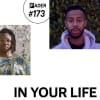Shy Glizzy doesn't necessarily command attention when he walks into a room, as his name would imply. He keeps his head down, not seeming to seek validation—when he performs, through his catalog, or even when he speaks. The charisma is undeniable, though. Shy, he says, in fact stands for Street's Hottest Youngin.
Born and raised around 37th Street in southeast Washington, D.C., Glizzy took to rapping while incarcerated as a juvenile. His sound is markedly southern, aided by production from the likes of K.E. On The Track, Metro Boomin, and Zaytoven—all Atlanta stalwarts—but his content is solidly mid-Atlantic. On his February 2014 tape, Young Jefe, Glizzy stepped into himself as a rapper without forsaking the streets that had already seen his potential. Lead single "Awwsome," Glizzy's most popular song to date, is almost like a dream realized.
This month, Glizzy followed up that success with his best tape yet, Law 3. At a listening session in DC's District Company Studio, he opened up to The FADER about his hometown, his potential book, and Ferguson. Glancing up occasionally as he stared into his phone, he had the confidence of a quarterback.
How did you know you had a hit with "Awwsome"? You can listen to it. I know good music. I know what I want to hear on the radio and what I want to hear in the club. And that's what it was. I knew that was a banger soon as I did it. I dropped it a couple of weeks after.
Your first Law mixtape was more DC-oriented. As you get more popular, are you going to limit those references? That's what we were doing at the time. I was in DC running around. I was still a local rapper. Now I'm on a whole different level and a whole larger scale. No, I think you're supposed to stay true to who you are and your culture. And my culture hasn't been recognized yet. Any reference that DC knows, the world should know. They're gonna get it. If you come from what I come from, if you come from any type of struggle—not even from my type of environment—but if you ever had to struggle in life, period, you're gonna feel my music.
If Wale had never broken through and "DMV rap" never become a thing, what would you be doing? DMV still didn't become a thing. Nobody opened up a lane for DMV rap. No other artists broke out of that. Nobody put me on. I opened up my lane. I opened up Glizzy Gang lane, the southeast DC lane. That's what that is. We never had a rap lane. Nobody else has come through. Who did this for me? Nobody gave me a stamp and pulled me up or made no songs with me and it blew up. "Awwsome" blew up, all Shy Glizzy, no features. My movement is Shy Glizzy, Glizzy Gang. Nobody ain't backin' that, nobody ain't supporting that. We did all this.
A big part of your narrative is dealing with the police and the juvie charge you took earlier along with your father's death. How has that played out? It made me who I am today. It gave me a story to tell to the people. Without those things, what else would I be? I would be just like every other rapper just making up stuff. But I was able to live and survive those types of situations, and that's a blessing.
Are you personally affected by the situation in Ferguson with Mike Brown? I'm not affected because that's going on in my neighborhood everyday. I don't really feel that [it could've been me]. I don't ever fear stuff. I'm not worried about no police. I mean, they mess with me. They try to stop what I'm doing, but that's just the police. That's been going on. That's the world. Police are dirty people.
You said in your GEN F interview that you originally set out to write a book. What was it going to be about? Whatever. I'm just a person of intelligence, so whatever I wanted the book to be about—if I wanted it to be a fairy tale then that's what it was what it was going to be. I don't know. It maybe was going to be about my story because that's what my first rap was about: the robbery that I did, and the charge I caught, and the consequences behind it. But, you know, that book wasn't that long, so it became a rap. Yeah, I would want to do a book because I've been through so much. I want to do a book, a movie—I want to do everything in the world. I'm a businessman.
How did you end up linking with John Wall? That's my homie. That's my brother. I'm the hottest guy around. And he's doing his thing for the city. We linked up on our own just being out. I make a lot of noise in the city and he does too. We cliqued up and we ain't never looked back since.
You've said in your raps that you weren't blessed to be LeBron or have a Michael Vick arm. Did you think, coming up in DC, rapping or balling was the only way to make it? That's really coming out of any hood, not really just DC. DC is DC—this is where the president lives. There's big opportunities here. Don't get it wrong. But I'm just not one of those people that was fortunate enough to be dunkin' and being like Michael Vick. I wouldn't rather be doing nothing but what I'm doing right now, and that's providing a way for me and mine.
Is it weird going around your way now with all the attention? No, I'm a big dog. Jefe isn't something that's just made up. That's what's going on. That's my lifestyle. I go anywhere. If I'm comfortable, or if I know someone in the spot, or I'm used to going to those spots, I ain't gonna stop going just because I'm a famous person. I still got that same respect I had when I was nobody.
Do you think rap glamorizes hood life? Yeah, they glamorize me. I'm the definition of that. I'm really living like that. I've been through those things that some rappers ain't really been through. I haven't wanted to be a rapper my whole life. This was one of my last resorts, and it turned out to be the best thing that ever happened to me. You see how they gravitate to me. I'm a hood dude. Anybody that's really street, how are you not going to want a piece of that? They want some of that knowledge… Everyone glamorizes us. They want to be like street guys.
And what's the deal with [record label] 300? They work for me. They came to me. They said I was doing my thing. And I had a lot of labels reaching out at the time. They offered what other people weren't offering—they made an offer that was hard to refuse. But I'm still the boss. Glizzy Gang is independent. 300 is just a platform to put out my music on a higher scale than what I've been doing. I'm still moving on my own. I'm still pulling all these strings over here.
Why is the tape's subtitle 'Now Or Never?' It's now or never. How long can I wait? I'm impatient right now. It's time to go. And the music that I got, that's the mode that it put me in. It's like if this don't happen now, then real music is never coming back. This is it. This is the one.


